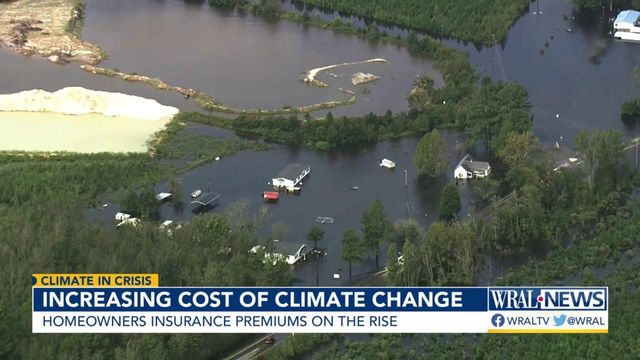Climate change is making some homes too costly to insure
There were 20 separate billion-dollar U.S. natural disasters in 2021 — including a deep freeze, wildfires, flooding, tornado outbreaks and other severe weather — costing a total of $145 billion, according to the National Oceanic and Atmospheric Administration (NOAA).
Billion-dollar disasters that used to strike every 82 days in 80s now hit every 18 days on average, according to Climate Central.
The growing tab of climate change is having a costly impact on consumers and homeowners, with insurance premiums soaring higher than the cost of inflation, according to a report from PolicyGenius.
"Climate change will put homes underwater financially before they are underwater physically," said Alex Kolker, a climate scientist with the University of Louisiana's Research Marine Lab.
A combination of more severe disasters, rising sea level and sinking soil is increasing flood risk.
New Orleans and Houston are sinking at a rate of 2 inches per year. Some coastal areas of North Carolina are expected to reach that rate by 2050. It includes Pamlico County, which is currently sinking at a rate of 8 inches per century.
"We're beginning to see a wave of climate impacts that's going from the southeast and areas that are sinking, and moving into areas that have historically been less vulnerable like the mid-Atlantic and Northeast," Kolker said.

Many coastal areas are also more vulnerable because natural defenses are deteriorating including marshes, mangroves, barrier islands and beaches.
"Some for climate change, and some just because people have altered the coast for a whole lot of other reasons, many related to development," Kolker said.
The uptick in costly climate events combined with rising costs to rebuild and “demand surges” after natural disasters have triggered higher homeowners insurance premiums.
According the PolicyGenius report, 90% of homeowners saw premiums jump over a year period from May 2021, costing an average increase of $134 more per year. In North Carolina, homeowners saw an average increase of 13.1% last year.
Regardless of where you live, the Barry of the Insurance Information Institute said it’s critical to do your homework before purchasing a property.
Before making an offer, you can use free tools like ClimateCheck or Risk Factor to measure long-term climate risk for a specific property.
Current homeowners may ask their insurance provider about discounts for taking steps to mitigate possible damage from climate events, such as storm-proofing your home, according to a report from Policygenius.
You may also save money by shopping around and bundling home and auto policies. Homeowners insurance is no longer a “set-it-and-forget-it” type of thing, the report said.
And if you have sufficient emergency savings, you may consider lowering your premiums by increasing your deductible, the report said.











